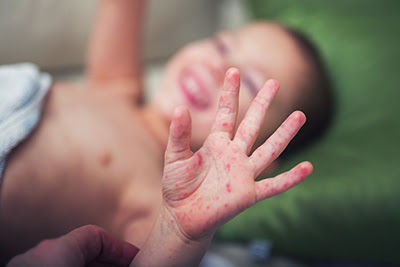Hand Foot and Mouth Disease (HFMD) / Herpangina
While HFMD cases are on the rise in Singapore, new parents tend to be less aware of the signs and symptoms as they are often more worried about other newborn issues. Here are some important education tips on HFMD from Dr Wendy.
What is Hand-Foot-Mouth Disease (HFMD) or Herpangina?
Hand-Foot-Mouth-Disease (HFMD) is a highly infectious disease common in young children attending childcare or preschool.

How is HFMD or Herpangina Spread?
- Bad hygiene practices
- Contact with saliva
- Droplets from sneezing or coughing
- Faecal matter of an infected person (e.g. when changing the diaper of a young child)
Is My Child At Risk of HFMD or Herpangina?
Why Does My Child Get HFMD Again?
When an individual is diagnosed with HFMD or herpangina, he or she will develop immunity towards the specific strain of virus that has caused the current infection. However, as there are several different strains of HFMD or herpangina viruses, it is possible to contract a different strain of the virus a subsequent time.
How Can I Prevent HFMD or Herpangina?
Practising good hygiene is the best way to prevent these illnesses:

- You and your child should cultivate proper hand hygiene habits before having meals and after using the toilet.
- Do not forget to cover your mouth and nose while coughing or sneezing as this can help reduce the spread of viruses.
- It is important to start at a young age when they are still learning. Leading by example and guiding them is key.
You should keep in mind that young toddlers do not understand the concept of hygiene so parents, caregivers and even preschool teachers should take greater care to cultivate proper hygiene habits. If your children are older, they are more aware of their actions and are able to take more control of their own hygiene. It is important to make sure they keep practising these habits.
How Can I Prevent the Spread of HFMD or Herpangina?
When you are caring for a child with HFMD, always remember to practice proper handwashing techniques after any direct contact with your child, especially before handling food. Disinfecting surfaces and toys can help reduce the spread of the disease to others. Lastly, if your child is contagious, avoid outdoor activities, going to school or play areas as the disease may spread and infect other healthy children.

